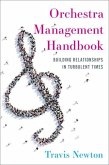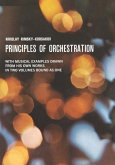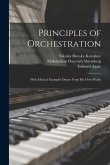- Broschiertes Buch
- Merkliste
- Auf die Merkliste
- Bewerten Bewerten
- Teilen
- Produkt teilen
- Produkterinnerung
- Produkterinnerung
The Beat Stops Here Lessons on and off the Podium for Today's Conductor is an insightful, occasionally cheeky view of conducting, from score study to Stravinsky, from tempo to Taoism, from brushing the dog to Beethoven. In short, The Beat Stops Here is a compendium of style and substance in the real world of today's conductor.
Andere Kunden interessierten sich auch für
![Orchestra Management Handbook Orchestra Management Handbook]() Travis NewtonOrchestra Management Handbook43,99 €
Travis NewtonOrchestra Management Handbook43,99 €![Principles of Orchestration Principles of Orchestration]() Nikolai Rimsky-KorsakovPrinciples of Orchestration35,99 €
Nikolai Rimsky-KorsakovPrinciples of Orchestration35,99 €![The Study of Orchestration The Study of Orchestration]() Samuel AdlerThe Study of Orchestration155,99 €
Samuel AdlerThe Study of Orchestration155,99 €![Inspire Your Choir Inspire Your Choir]() Mark De-LisserInspire Your Choir16,99 €
Mark De-LisserInspire Your Choir16,99 €![Mark Colenburg - The Beat Matrix Unlocked Mark Colenburg - The Beat Matrix Unlocked]() Mark Colenburg - The Beat Matrix Unlocked24,99 €
Mark Colenburg - The Beat Matrix Unlocked24,99 €![Conducting Music Today Conducting Music Today]() Bruce HangenConducting Music Today27,99 €
Bruce HangenConducting Music Today27,99 €![Principles of Orchestration Principles of Orchestration]() Nikolay Rimsky-KorsakovPrinciples of Orchestration28,99 €
Nikolay Rimsky-KorsakovPrinciples of Orchestration28,99 €-
-
-
The Beat Stops Here Lessons on and off the Podium for Today's Conductor is an insightful, occasionally cheeky view of conducting, from score study to Stravinsky, from tempo to Taoism, from brushing the dog to Beethoven. In short, The Beat Stops Here is a compendium of style and substance in the real world of today's conductor.
Hinweis: Dieser Artikel kann nur an eine deutsche Lieferadresse ausgeliefert werden.
Hinweis: Dieser Artikel kann nur an eine deutsche Lieferadresse ausgeliefert werden.
Produktdetails
- Produktdetails
- Verlag: Oxford University Press
- Seitenzahl: 320
- Erscheinungstermin: 23. Februar 2017
- Englisch
- Abmessung: 277mm x 216mm x 23mm
- Gewicht: 907g
- ISBN-13: 9780190605889
- ISBN-10: 019060588X
- Artikelnr.: 47814748
- Herstellerkennzeichnung
- Libri GmbH
- Europaallee 1
- 36244 Bad Hersfeld
- gpsr@libri.de
- Verlag: Oxford University Press
- Seitenzahl: 320
- Erscheinungstermin: 23. Februar 2017
- Englisch
- Abmessung: 277mm x 216mm x 23mm
- Gewicht: 907g
- ISBN-13: 9780190605889
- ISBN-10: 019060588X
- Artikelnr.: 47814748
- Herstellerkennzeichnung
- Libri GmbH
- Europaallee 1
- 36244 Bad Hersfeld
- gpsr@libri.de
Director of Orchestral Studies at the College-Conservatory of Music, University of Cincinnati, Mark Gibson enjoys a teaching and conducting career that spans four decades and three continents. Among his former students are many of today's up and coming maestros, including Xian Zhang, Tung-Chieh Chuang, Annunziata Tomaro and Olivier Ochanine. Mr. Gibson is a native of New Jersey.
* Acknowledgements
* Preface
* Foreword: Teaching Conducting
* List of Musical Examples and Illustrations
* PART 1: REPERTOIRE LESSONS
* Introduction to Repertoire Lessons
* A Glossary of Conducting Gesture
* Chapter 1. Overture
* Ludwig van Beethoven: "Die Geschöpfe des Prometheus," Op. 43 (1801)
* Gioacchino Rossini: La Cenerentola (1817)
* Felix Mendelssohn: "Die schöne Melusine," Op. 32 (1833)
* Giuseppe Verdi: Les Vêpres Siciliennes (I Vespri Siciliani) (1855)
* Johannes Brahms: Tragische Ouvertüre, Op. 81 (1880)
* Chapter 2. Opera
* Wolfgang Amadeus Mozart: Don Giovanni, K. 527 (1787)
* Sestetto: "Solo, solo in buio loco"
* Giuseppe Verdi: Un ballo in maschera (1859)
* Finale 3º Scena e Romanza:
* "Forse la soglia attinse...Ma se m'è forza perderti"
* Jules Massenet: Manon (1884)
* Duo: "Pardonnez-moi, Dieu de toute puissance"
* Giacomo Puccini: Madama Butterfly (1904)
* Duetto: "Viene la sera"
* Chapter 3. Smaller symphonic works
* W.A.Wolfgang Amadeus Mozart: Symphony No. 29 in A Major, K. 201
(1774)
* Antonín Dvorák: Scherzo Capriccioso, Op. 66 (1883)
* Maurice Ravel: Valses nobles et sentimentales (1911, orch. 1912)
* Chapter 4. Concerto and solo works
* Ludwig van Beethoven: Piano Concerto no. 4 in G Major, Op. 58
(1805-6)
* Gustav Mahler: Des knaben Wunderhorn (1887-1899); Four songs
* Jean Sibelius: Violin Concerto in D Minor, Op. 47 (1904)
* Chapter 5. Larger symphonic works
* Nikolai Rimsky-Korsakov: Scheherazade, Op. 35 (1888)
* Igor Stravinsky: Petrouchka: Scènes burlesques en 4 tableaux (1911,
rev. 1947)
* PART 2: PROFESSIONAL LESSONS
* Chapter 6. The Conductor as Teacher
* Not the Eternal Tao
* Are Two Hands Better?
* MAKE YOUR OWN METRONOME!
* Storytelling
* Heads, Shoulders, Knees and Toes
* Developing Score Reading Skills (by A. Tomaro)
* Quantifiable
* Chapter 7. The Conductor as Scholar
* On Rewriting the Act 3 Finale of Bizet's Les Pêcheurs de Perles
(1863)
* Heroism Denied: Movement Order in Mahler's Sixth Symphony (1903-4,
rev. 1906)
* Puccini's Turandot (1924): A Conductor's Perspective
* Chapter 8. The Conductor as Leader
* Working with the Orchestra: Bill of Rights
* Three-part Conducting Rules
* More Rules for the Road
* Talk Show - a cautionary tale
* Quiz Show
* Working in the Opera House:"Gott, welch dunkel hier!"
* Working with Singers: A Breed Apart
* Working with Chorus: Dreamers of Dreams
* Building a Career: Ou voulez-vous allez?
* POSTSCRIPT: Present and Future Tense
* Appendix A: Musical works and editions
* Appendix B: Texts and Translations
* Appendix C: Tempo Indications and Metronome Markings
* Appendix D: Endnotes
* Appendix E: Resource materials/bibliography
* INDEX
* Preface
* Foreword: Teaching Conducting
* List of Musical Examples and Illustrations
* PART 1: REPERTOIRE LESSONS
* Introduction to Repertoire Lessons
* A Glossary of Conducting Gesture
* Chapter 1. Overture
* Ludwig van Beethoven: "Die Geschöpfe des Prometheus," Op. 43 (1801)
* Gioacchino Rossini: La Cenerentola (1817)
* Felix Mendelssohn: "Die schöne Melusine," Op. 32 (1833)
* Giuseppe Verdi: Les Vêpres Siciliennes (I Vespri Siciliani) (1855)
* Johannes Brahms: Tragische Ouvertüre, Op. 81 (1880)
* Chapter 2. Opera
* Wolfgang Amadeus Mozart: Don Giovanni, K. 527 (1787)
* Sestetto: "Solo, solo in buio loco"
* Giuseppe Verdi: Un ballo in maschera (1859)
* Finale 3º Scena e Romanza:
* "Forse la soglia attinse...Ma se m'è forza perderti"
* Jules Massenet: Manon (1884)
* Duo: "Pardonnez-moi, Dieu de toute puissance"
* Giacomo Puccini: Madama Butterfly (1904)
* Duetto: "Viene la sera"
* Chapter 3. Smaller symphonic works
* W.A.Wolfgang Amadeus Mozart: Symphony No. 29 in A Major, K. 201
(1774)
* Antonín Dvorák: Scherzo Capriccioso, Op. 66 (1883)
* Maurice Ravel: Valses nobles et sentimentales (1911, orch. 1912)
* Chapter 4. Concerto and solo works
* Ludwig van Beethoven: Piano Concerto no. 4 in G Major, Op. 58
(1805-6)
* Gustav Mahler: Des knaben Wunderhorn (1887-1899); Four songs
* Jean Sibelius: Violin Concerto in D Minor, Op. 47 (1904)
* Chapter 5. Larger symphonic works
* Nikolai Rimsky-Korsakov: Scheherazade, Op. 35 (1888)
* Igor Stravinsky: Petrouchka: Scènes burlesques en 4 tableaux (1911,
rev. 1947)
* PART 2: PROFESSIONAL LESSONS
* Chapter 6. The Conductor as Teacher
* Not the Eternal Tao
* Are Two Hands Better?
* MAKE YOUR OWN METRONOME!
* Storytelling
* Heads, Shoulders, Knees and Toes
* Developing Score Reading Skills (by A. Tomaro)
* Quantifiable
* Chapter 7. The Conductor as Scholar
* On Rewriting the Act 3 Finale of Bizet's Les Pêcheurs de Perles
(1863)
* Heroism Denied: Movement Order in Mahler's Sixth Symphony (1903-4,
rev. 1906)
* Puccini's Turandot (1924): A Conductor's Perspective
* Chapter 8. The Conductor as Leader
* Working with the Orchestra: Bill of Rights
* Three-part Conducting Rules
* More Rules for the Road
* Talk Show - a cautionary tale
* Quiz Show
* Working in the Opera House:"Gott, welch dunkel hier!"
* Working with Singers: A Breed Apart
* Working with Chorus: Dreamers of Dreams
* Building a Career: Ou voulez-vous allez?
* POSTSCRIPT: Present and Future Tense
* Appendix A: Musical works and editions
* Appendix B: Texts and Translations
* Appendix C: Tempo Indications and Metronome Markings
* Appendix D: Endnotes
* Appendix E: Resource materials/bibliography
* INDEX
* Acknowledgements
* Preface
* Foreword: Teaching Conducting
* List of Musical Examples and Illustrations
* PART 1: REPERTOIRE LESSONS
* Introduction to Repertoire Lessons
* A Glossary of Conducting Gesture
* Chapter 1. Overture
* Ludwig van Beethoven: "Die Geschöpfe des Prometheus," Op. 43 (1801)
* Gioacchino Rossini: La Cenerentola (1817)
* Felix Mendelssohn: "Die schöne Melusine," Op. 32 (1833)
* Giuseppe Verdi: Les Vêpres Siciliennes (I Vespri Siciliani) (1855)
* Johannes Brahms: Tragische Ouvertüre, Op. 81 (1880)
* Chapter 2. Opera
* Wolfgang Amadeus Mozart: Don Giovanni, K. 527 (1787)
* Sestetto: "Solo, solo in buio loco"
* Giuseppe Verdi: Un ballo in maschera (1859)
* Finale 3º Scena e Romanza:
* "Forse la soglia attinse...Ma se m'è forza perderti"
* Jules Massenet: Manon (1884)
* Duo: "Pardonnez-moi, Dieu de toute puissance"
* Giacomo Puccini: Madama Butterfly (1904)
* Duetto: "Viene la sera"
* Chapter 3. Smaller symphonic works
* W.A.Wolfgang Amadeus Mozart: Symphony No. 29 in A Major, K. 201
(1774)
* Antonín Dvorák: Scherzo Capriccioso, Op. 66 (1883)
* Maurice Ravel: Valses nobles et sentimentales (1911, orch. 1912)
* Chapter 4. Concerto and solo works
* Ludwig van Beethoven: Piano Concerto no. 4 in G Major, Op. 58
(1805-6)
* Gustav Mahler: Des knaben Wunderhorn (1887-1899); Four songs
* Jean Sibelius: Violin Concerto in D Minor, Op. 47 (1904)
* Chapter 5. Larger symphonic works
* Nikolai Rimsky-Korsakov: Scheherazade, Op. 35 (1888)
* Igor Stravinsky: Petrouchka: Scènes burlesques en 4 tableaux (1911,
rev. 1947)
* PART 2: PROFESSIONAL LESSONS
* Chapter 6. The Conductor as Teacher
* Not the Eternal Tao
* Are Two Hands Better?
* MAKE YOUR OWN METRONOME!
* Storytelling
* Heads, Shoulders, Knees and Toes
* Developing Score Reading Skills (by A. Tomaro)
* Quantifiable
* Chapter 7. The Conductor as Scholar
* On Rewriting the Act 3 Finale of Bizet's Les Pêcheurs de Perles
(1863)
* Heroism Denied: Movement Order in Mahler's Sixth Symphony (1903-4,
rev. 1906)
* Puccini's Turandot (1924): A Conductor's Perspective
* Chapter 8. The Conductor as Leader
* Working with the Orchestra: Bill of Rights
* Three-part Conducting Rules
* More Rules for the Road
* Talk Show - a cautionary tale
* Quiz Show
* Working in the Opera House:"Gott, welch dunkel hier!"
* Working with Singers: A Breed Apart
* Working with Chorus: Dreamers of Dreams
* Building a Career: Ou voulez-vous allez?
* POSTSCRIPT: Present and Future Tense
* Appendix A: Musical works and editions
* Appendix B: Texts and Translations
* Appendix C: Tempo Indications and Metronome Markings
* Appendix D: Endnotes
* Appendix E: Resource materials/bibliography
* INDEX
* Preface
* Foreword: Teaching Conducting
* List of Musical Examples and Illustrations
* PART 1: REPERTOIRE LESSONS
* Introduction to Repertoire Lessons
* A Glossary of Conducting Gesture
* Chapter 1. Overture
* Ludwig van Beethoven: "Die Geschöpfe des Prometheus," Op. 43 (1801)
* Gioacchino Rossini: La Cenerentola (1817)
* Felix Mendelssohn: "Die schöne Melusine," Op. 32 (1833)
* Giuseppe Verdi: Les Vêpres Siciliennes (I Vespri Siciliani) (1855)
* Johannes Brahms: Tragische Ouvertüre, Op. 81 (1880)
* Chapter 2. Opera
* Wolfgang Amadeus Mozart: Don Giovanni, K. 527 (1787)
* Sestetto: "Solo, solo in buio loco"
* Giuseppe Verdi: Un ballo in maschera (1859)
* Finale 3º Scena e Romanza:
* "Forse la soglia attinse...Ma se m'è forza perderti"
* Jules Massenet: Manon (1884)
* Duo: "Pardonnez-moi, Dieu de toute puissance"
* Giacomo Puccini: Madama Butterfly (1904)
* Duetto: "Viene la sera"
* Chapter 3. Smaller symphonic works
* W.A.Wolfgang Amadeus Mozart: Symphony No. 29 in A Major, K. 201
(1774)
* Antonín Dvorák: Scherzo Capriccioso, Op. 66 (1883)
* Maurice Ravel: Valses nobles et sentimentales (1911, orch. 1912)
* Chapter 4. Concerto and solo works
* Ludwig van Beethoven: Piano Concerto no. 4 in G Major, Op. 58
(1805-6)
* Gustav Mahler: Des knaben Wunderhorn (1887-1899); Four songs
* Jean Sibelius: Violin Concerto in D Minor, Op. 47 (1904)
* Chapter 5. Larger symphonic works
* Nikolai Rimsky-Korsakov: Scheherazade, Op. 35 (1888)
* Igor Stravinsky: Petrouchka: Scènes burlesques en 4 tableaux (1911,
rev. 1947)
* PART 2: PROFESSIONAL LESSONS
* Chapter 6. The Conductor as Teacher
* Not the Eternal Tao
* Are Two Hands Better?
* MAKE YOUR OWN METRONOME!
* Storytelling
* Heads, Shoulders, Knees and Toes
* Developing Score Reading Skills (by A. Tomaro)
* Quantifiable
* Chapter 7. The Conductor as Scholar
* On Rewriting the Act 3 Finale of Bizet's Les Pêcheurs de Perles
(1863)
* Heroism Denied: Movement Order in Mahler's Sixth Symphony (1903-4,
rev. 1906)
* Puccini's Turandot (1924): A Conductor's Perspective
* Chapter 8. The Conductor as Leader
* Working with the Orchestra: Bill of Rights
* Three-part Conducting Rules
* More Rules for the Road
* Talk Show - a cautionary tale
* Quiz Show
* Working in the Opera House:"Gott, welch dunkel hier!"
* Working with Singers: A Breed Apart
* Working with Chorus: Dreamers of Dreams
* Building a Career: Ou voulez-vous allez?
* POSTSCRIPT: Present and Future Tense
* Appendix A: Musical works and editions
* Appendix B: Texts and Translations
* Appendix C: Tempo Indications and Metronome Markings
* Appendix D: Endnotes
* Appendix E: Resource materials/bibliography
* INDEX








